- Home
- Steve Hockensmith
The White Magic Five & Dime (A Tarot Mystery) Page 10
The White Magic Five & Dime (A Tarot Mystery) Read online
Page 10
“Well, you’d better get to it. In a few seconds we’re going to be in the middle of a Boy Scout jamboree.”
There were about thirty yards of trail left between the WASP braves and our spot at the edge of the ridge.
“It’s obvious I can’t tell you what to do, Alanis,” Logan said. “But I can ask a favor. Steer clear of Anthony Grandi.”
“What if he doesn’t steer clear of me?”
“I’ll take care of that. You just take care of yourself. Don’t take any stupid risks.”
“I promise not to go sky diving or bungee jumping. Beyond that, I do what I do.”
Logan shook his head and let out a long breath. “I don’t know if you’re the bravest woman I’ve ever known or…something else I won’t say.”
“I’m probably the something else. What’s that?”
Logan was pulling a small sheet of folded paper from his jacket pocket. He handed it to me.
“You wanted to know who’d made complaints to the police about your mother. There you go.”
I unfolded the paper and looked over the list. It was shockingly short.
“Just three people in the three years she was here? Wow. Mom must have been even slicker than I remember.”
“Yeah, well, good luck making amends for whatever she did. Just keep me out of it, would you? You didn’t get those names from me.”
I refolded the paper and stuffed it in my pocket. “What names, Officer?”
Logan smiled wryly. “You are a bad influence, you know that? You’re not even in town twenty-four hours and already I feel like I’m the Bad Lieutenant.”
“Welcome to the Dark Side, Detective. You might like it. It’s cooler over here in the shade.”
“Hey, folks!” one of the ten not-so-little non-indians said. “We’re about to start a sun dance. Feel free to join in.”
“Sorry,” I told him. “Things to do, people to see.”
Debts to pay.
Killers to find.
Dangers to ignore.
Yeah, my plate was full—and none of it was very appetizing.
So why was I feeling so good as Logan and I hiked back down the trail?
These days, hermits live in cabins in Idaho, where they write anti-government manifestos and tinker with letter bombs and develop body odors as deadly as the anthrax spores they wish they had in the fridge. That’s not what the Hermit of the tarot’s about at all. He uses his lantern to search for truth, not the keys to his gun rack. He’s not a misanthrope, he’s a wanderer in the wilderness seeking wisdom. If you come across a Hermit in the cards (or in your life), follow him (or her). You’ll learn a thing or two. Just watch out for the body odor. That part might not have changed much.
Miss Chance, Infinite Roads to Knowing
The three names on Logan’s list were Victor Castellanos, Kenneth Meldon, and William Riggs. Three men. Weird.
I didn’t know much about the crystal-ball crowd, but I always assumed most of their clients/prey were women. Plus, men are less likely to make a stink when they’re swindled. It’s pride. They hate admitting how stupid they’ve been—which lets the con artist move on to the next dumb mark, and the next and the next and the next. Ninety percent of confidence crimes are never reported at all. True fact—or as true as anything else Biddle ever told me.
I used my phone to look for listings, but I only came up with one address. William A. Riggs lived at 1703 O’Hara Drive. There were three Castellanoses in town, but none named Victor. And there were no Meldons at all, Ken or otherwise.
1703 O’Hara Drive, here I come.
First, though, it was back to the White Magic Five & Dime for another wardrobe change. I was about to visit someone who’d been burned by my mother. Showing up on his doorstep looking like another member of Fortunetellers Local 557 didn’t seem like a good idea.
As I walked up to the Five & Dime, I was stopped by someone who could have been my union rep: Josette, the groovy gray-haired hippie dip who ran the shop across the street.
“Ms. Passalis?”
I didn’t feel like explaining that my mother and I had different names. I wasn’t super attached to “Alanis McLachlan” anyway. I’d made that one up when I was eighteen, and it showed.
“Yes?” I said.
“I’m so glad I saw you. There’s something I need to tell you.”
“Oh?”
“About an hour ago, I happened to glance this way and saw a man trying to get into your mother’s store. He tried the door, banged on the glass, looked in the windows. He seemed really agitated. He was shouting something, but by the time I came outside to hear what it was, he was leaving.”
“What did he look like?”
“He was an older gentleman. An old gentleman, really. In his seventies, maybe. Not very big. He was wearing sweatpants and a cardigan and a baseball cap.”
I crossed my fingers.
“Do you know Anthony Grandi?”
Josette made a face that seemed to say she didn’t know the guy, but she knew what he smelled like, and it wasn’t good.
“Not really. But I’m familiar with him.”
“Could it have been him?”
“No. Definitely not.”
Damn. So now I had two stalkers. I was just glad one of them was an AARP member.
“I feel like I’ve seen him before, but I can’t say where,” Josette went on. “I’m sorry I can’t tell you more. I thought you ought to know, though.”
“Thanks. I appreciate it.”
I turned to go.
“I also wanted to tell you how sorry I am about what happened to your mother,” Josette said. “I had no idea who you were when I read for you yesterday.”
“That’s okay. How could you have known?”
“Have the police made any progress? I thought I saw you with Josh Logan this morning.”
Ahhh, the joys of life in Mayberry. The neighbor-folk had taken notice of my comings and goings.
I was going to have to start using the back door.
“No. No news,” I said.
“Well, I’m sure that won’t be the case forever.”
“Thanks. We’ll see.”
Again I turned to go.
“Ms. Passalis, I hope you won’t mind my saying so, but…”
By the time I turned back her way, Josette seemed to have changed her mind about speaking at all. Her lips were pressed together in the kind of tight, sad smile a mother might put on before saying, “You know, honey, that dress would probably look better on someone with hips that are a little…less.”
Someone else’s mother, I mean. Mine would’ve said, “You look like a satin-wrapped ham. Put on something else.” Without the sad smile.
“Yes?” I said.
Josette reached out and took my hands in hers. I didn’t mind so much. At least it meant she wasn’t going to hug me.
She was wearing a sleeveless, shapeless, hemp-looking smock thingie that revealed lean but muscular arms it probably would be hard to wriggle free of. Who knew yoga could give a gal such guns?
“If you need a friend,” Josette said, “someone who knows this place and these people and how to run a business and build a life here, I hope you’ll come talk to me.”
“Thank you. That’s very kind.”
I gave her hands a squeeze, freed myself, and escaped into the White Magic Five & Dime.
It was very kind. Too kind. The kind of kind that kind of freaks me out.
I didn’t see a lot of kindness as a kid. When I did, it wasn’t called kindness. It was called weakness. Or bogus.
I didn’t see it as a weakness anymore.
The bogus part I was working on.
Case in point: I was changing clothes, going from Gypsy to Blank Slate, and I was thinking about Josette. And it occurred to me th
at she wasn’t just being too kind, but her reading the day before had been too good. There’d been the talk about big changes and new places and death and, hovering over it all, that tricky, wicked bitch, the reversed Queen of Wands. Was I really supposed to believe Josette could be that on the nose without knowing who I was?
Maybe word had gotten around about me even sooner than I’d thought. Maybe more people than Eugene Wheeler had been expecting me.
Or maybe Josette really could see the future in a bunch of cards that looked like a Renaissance fair on acid. She’d even hinted that there was an interesting (and interested) man in my future, and then Logan comes along and…whatever was happening there. Who could have predicted that? Just because Mom was a sham didn’t mean every tarot reader was.
Of course, my mother would’ve been ashamed of me for having such thoughts. She would’ve found them hopelessly, dangerously, disgustingly naïve.
So I kept having them.
1701 O’Hara Drive had an immaculately manicured lawn and blooming rose bushes and little granite cherubs frozen mid-scamper here and there around the hedges. 1705 O’Hara Drive had a tricycle on the porch and a scooter propped against the garage door and balls and dolls and plastic buckets and shovels scattered across the grass.
1703 sat between them like a suburban Sargasso Sea. The small plot was barren and sun-baked. The house was a drab brown box. The driveway was empty. No name on the mailbox. (“The Baumgartners” had the granite cherubs. “The Clarks” had the real kids.) There wasn’t even a number on the house. If it hadn’t been for 1701 and 1705, you’d never have known what the address was. The place looked so spartan and lifeless, it could’ve been a coffin waiting to be buried.
This was the home of William Riggs, disgruntled Five & Dime customer, and before I’d even stepped onto the porch I knew the man had all the warmth and vibrancy of an ice cube.
I put an unassuming smile on my face. I didn’t expect it to last long.
There was a moment of silence after I rang the bell, then the sound of soft, slow footsteps. The door opened just wide enough for a woman’s face to poke through. She looked wary, tentative, like a rabbit sticking her nose out of the warren to sniff for wolves.
“Yes?”
“Is this the home of William Riggs?”
“Yes.”
“Is he home?”
“No. He’s at work. Is he in some kind of trouble?”
“No.”
“Oh,” the woman said, sounding strangely disappointed. She looked a little younger than me, thirty maybe, with short blond hair and blue eyes and glasses. Her face was thin, almost gaunt, but she could’ve had the body of a linebacker for all I knew. The door hadn’t opened any wider.
“My name is Alanis McLachlan,” I said. “My mother was Athena Passalis. From the White Magic Five & Dime? On Furnier Avenue?”
“Oh!”
“I’m here because—”
“I can’t talk to you!”
The rabbit jumped back into her warren. The door slammed shut.
I didn’t hear it being locked, though. And I didn’t hear footsteps either. The woman was still only feet away from me.
“I just wanted to talk to Mr. Riggs a moment,” I said. “I’ve heard he was unhappy with my mother for some reason, and I wanted to see if it was anything I needed to know about. I’m in town to wrap up her affairs—you might have heard that she’s dead—and I’d hate to leave with any disputes still unresolved.”
The door stayed shut.
I started to back away.
“I hope you’ll tell him I came by. He can find me over at the Five & Dime if he wants to talk. I’m sorry for any trouble my mother might have caused him.”
I was about to turn and walk back to my car when the door opened again—wide this time.
“You really don’t want to talk to my husband about Athena,” the woman said. “But you can talk to me.”
Mrs. William Riggs—Marsha—did not have the body of a linebacker, unless you were looking at the skinniest twelve-year-old in the pee wee league. She was small, even scrawny. As shapely and curvaceous as a lamppost.
She hadn’t always been like that.
The inside of the house was spare and unadorned, like the outside, with bare walls and no clutter or tchotchkes and only one picture in sight: Marsha and her husband on their wedding day. He was wearing an Army uniform. She was in a bridal gown filled out with at least fifteen more pounds than she carried now. She had a rosy glow and a big smile. They were gone, too.
Something had deflated her, left her shriveled. I could guess what it was.
“Your mother was the best thing that’s happened to me in this town,” Marsha said.
“Really?”
“Oh, absolutely. Bill and I moved here a year ago, and at first I was so lonely. I didn’t know a soul, and…well, we’re not real social. But then one day I was driving home from the grocery store and I passed your mother’s place and on a sudden whim I stopped and went in. And I’m so glad I did! I didn’t know a thing about tarot cards, but Athena was a great listener and full of such wonderful advice.”
“I’m glad to hear it.”
“Do you read?”
“Yes.”
She hadn’t said “do you read tarot” so technically it wasn’t a lie.
“I’m sure you must be great at it if your mom taught you. She was amazing. It was like she knew me better than I know myself.”
“Yeah. Mom really understood what makes people tick.”
“She sure did.”
Marsha smiled. The memory of my mother seemed to make her genuinely happy.
That made one person in the world.
“So why was there a problem with your husband?” I asked.
“I begged him not to go to the police.”
“Why did he?”
“The last time I spoke to Athena, I just apologized and apologized. I was bawling the whole time.”
Marsha sniffed and wiped at her cheek. I wouldn’t have thought she had the juice in her for tears, but there they were now. Two thin trickles, then she was dry.
“You used to talk to my mother about your husband,” I said.
Marsha nodded. “I didn’t have anybody else to talk to here. Sometimes I think that’s why Bill moved us to Arizona—so he wouldn’t have to share me with anyone. So all I’d have would be him.”
“Is that what Athena used to say?”
“Pretty much. She helped me see how controlling he is. I started to stand up for myself a little bit.”
“And Bill didn’t like that.”
“No. He said I was being brainwashed, like Athena was a cult leader or something. So he went to the police.”
“Giving someone advice isn’t illegal.”
“It was the money he complained about.”
“Oh.”
Here we go.
“I admit, it got a little out of hand,” Marsha said. “I just couldn’t stop myself. It felt like I needed Athena’s help with every conversation Bill and I had. And she was giving me a discounted rate. If I hadn’t been going every day—”
“Every day?”
“Well, Tuesday through Saturday. The days Bill was at work.”
“How long did that go on?”
“About two months.”
“And the discounted rate was—?”
“Fifty dollars.”
My eyes widened.
“She was doing special readings,” Marsha said. “Not just the Celtic Cross but other spreads she created just for me and my situation. Sometimes I’d be in the White Magic Five & Dime for hours while she laid it all out and explained it to me.”
“Fifty dollars a day would have added up after a couple months.”
“It did. That’s how Bill found out about Athena.
He noticed the money I’d been taking out and he started asking questions and I didn’t want to tell him everything, but…he made me. Then he went to the police.”
Marsha scoffed at her own words.
The irony.
Him going to the police.
“And the cops didn’t do anything,” I said.
“No. They just said ‘keep your wife on a tighter leash’—according to Bill, anyway.”
“Seems like you were on a pretty tight leash to begin with.”
“Well…now it’s even tighter.”
I looked at the wedding photo again. The groom had short-cropped blond hair and pale blue eyes and a big smile. I don’t know much about uniforms, but I could tell Riggs had been a private when the picture was taken.
“What did your husband do in the army?” I asked.
“Not much. Sometimes people think that’s why he’s so…intense. But he was never in Iraq or Afghanistan. He never got out of Fort Benning. The only battles he was in were with MPs.”
“I see,” I said.
And I did see. I saw a lot.
“What does Bill do now?”
“He works for Eureka Resorts International. He started with them back in Orlando, where we’re from, but last year he was transferred to the Sedona office. He’s a sales manager there. He and his team do timeshare presentations out at the Oak Creek Golf Resort.”
I nodded, smiling. Now I knew Bill Riggs was an asshole. He was in the same business as me.
“Berdache is actually closer to the resort than Sedona, so…” Marsha shrugged, slumped, shriveled just a little bit more. “Here we are.”
“Well, I’m glad my mother could make your time here a little easier, even if it was only for a while.”
“She truly was a godsend. I miss her every day.”
“It must have been a shock when you heard what happened to her.”
“Oh, it was. I just couldn’t believe it. Poor Athena. How could anyone have done something like that to her?”
“That’s what I keep wondering.”
Marsha looked away for a moment, then met my gaze again.
She heard it. The question I was asking without asking.
“Of course, I hadn’t seen her in weeks,” she said, “so in a way I felt like I’d lost her already.”

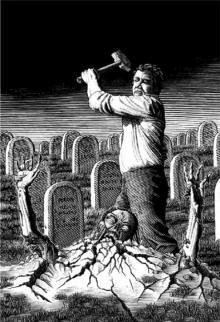 Dawn of the Dreadfuls
Dawn of the Dreadfuls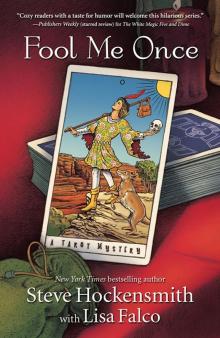 Fool Me Once: A Tarot Mystery
Fool Me Once: A Tarot Mystery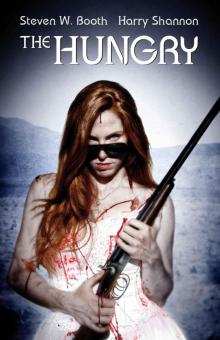 The Hungry
The Hungry Naughty: Nine Tales of Christmas Crime
Naughty: Nine Tales of Christmas Crime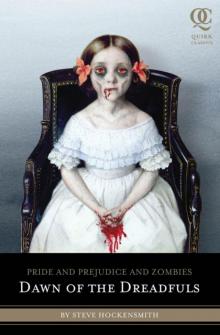 Pride and Prejudice and Zombies: Dawn of the Dreadfuls papaz-1
Pride and Prejudice and Zombies: Dawn of the Dreadfuls papaz-1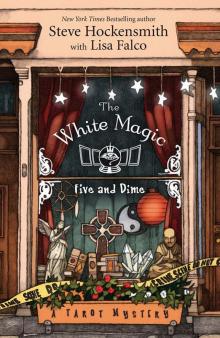 The White Magic Five & Dime (A Tarot Mystery)
The White Magic Five & Dime (A Tarot Mystery)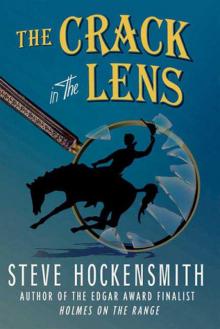 The Crack in the Lens
The Crack in the Lens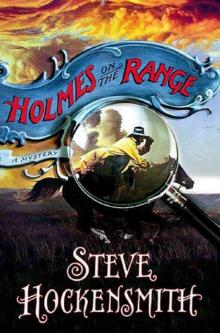 Holmes on the Range
Holmes on the Range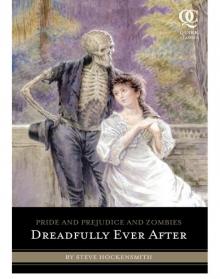 Dreadfully Ever After
Dreadfully Ever After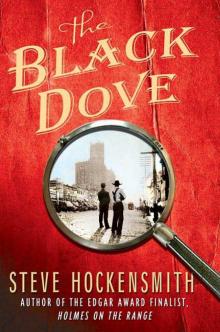 S Hockensmith - H03 - The Black Dove
S Hockensmith - H03 - The Black Dove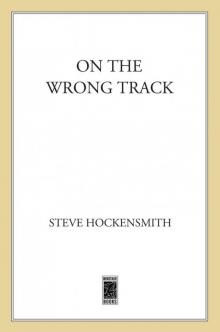 On the Wrong Track
On the Wrong Track Naughty-Nine Tales of Christmas
Naughty-Nine Tales of Christmas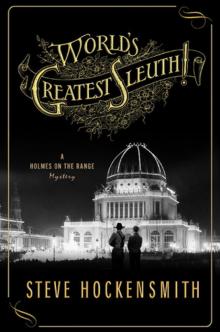 World's Greatest Sleuth!
World's Greatest Sleuth!